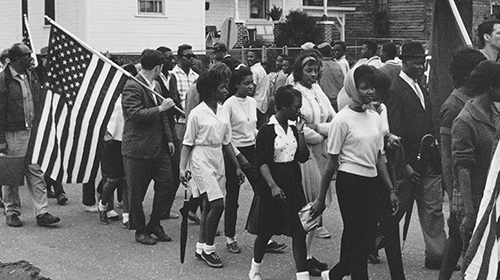
Like many Americans who watched President Obama's State of the Union address, I was moved by Desiline Victor, the 102 year-old African American woman who was forced to endure a six hour wait in order to vote in the 2012 presidential election. It is outrageous that anyone, let alone a woman of her age, should be subject to such a trial in order to exercise her most fundamental right as an American. Her determination and tenacity to cast her ballot was inspiring.
Hearing her story, I was reminded of my own 93-year old mother who cannot remember what she had for lunch five minutes after eating but who, months before the election, reminded me repeatedly to take the steps necessary to make sure that she could vote. Her insistence took me back to my childhood, when my parents and other African Americans in my community spoke about voting as both a duty and a right that was sacred.
It is no mystery why they believed voting was so important. Growing up in the south, they knew the extraordinary lengths taken to prevent blacks from participating in the democratic process. Poll taxes, outright refusals to register or intelligence tests—these were all sinister strategies used to deny blacks access to the ballot box.
As we honor Black History Month with an African American president in the White House, it is tempting to celebrate the work of the civil rights champions and the passage of the Voting Rights Act as relics of an era that was both the worst and best of times in our history. We are right to recognize the work of those brave and determined individuals who brought us closer to attaining the full promise of our constitutional rights, but we are dangerously mistaken if we regard efforts to disenfranchise voters on the basis of race as historical artifacts.
As we've seen over the last few years in states across the country, efforts to suppress the vote persist, and although the tactics have changed, the goal of disenfranchisement remains the same. After record minority voter turnout and registration in 2008, cuts to early voting, ID requirements and restrictions to registration were introduced in legislatures nationwide. Many of these states attempting to suppress the vote have long histories of discrimination at the polls. Fortunately, the Voting Rights Act holds these states accountable for any discriminatory voting practices by requiring them to submit any new voting laws or changes to the Department of Justice for approval, or "pre-clearance." Without this critical safeguard in place, millions of voters could have been denied access to the polls last November.
The ACLU will be at the Supreme Court later this month fighting to uphold the Voting Rights Act in our case, Shelby County v Holder. Although it is important to remember the past and celebrate the strides we've made, we must stand vigilant to protect the future of voting rights in America. The need to secure safeguards for our most fundamental right is still too much a part of our present to consign it to our past.
Learn more about racial justice and other civil liberties issues: Sign up for breaking news alerts, follow us on Twitter, and like us on Facebook.


